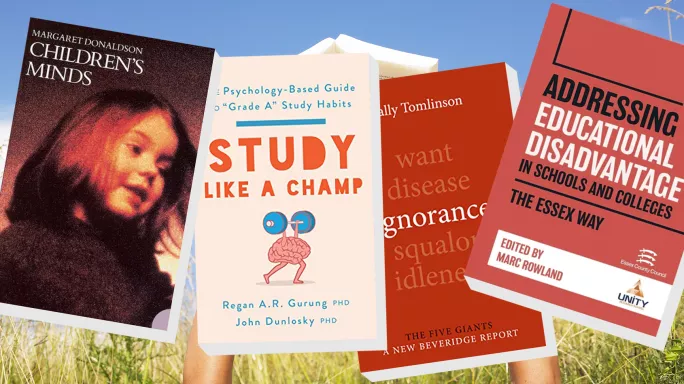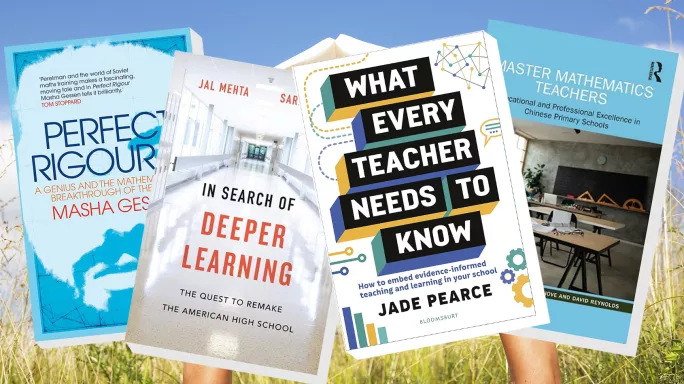
- Home
- Teaching & Learning
- General
- 8 expert-recommended education reads for summer
8 expert-recommended education reads for summer

When the final bell of the summer term has rung, it’s unlikely that your first thought will be about continuing professional development. And rightly so. Resting, relaxing and recharging should be the priorities, with all thoughts of school relegated to the end of the mental to-do list.
But if - or maybe when - you do find your thoughts turning to the classroom, a bit of book-based professional development can be just the thing. We asked our experts for their recommendations for summer reads on all sorts of topics, from tackling disadvantage to understanding research. Here are their picks:
Primary teaching
Children’s Minds by Margaret Donaldson
Recommended by Megan Dixon, doctoral student and associate lecturer at Sheffield Hallam University
I often start with a UKLA minibook. These short, easy reads are a perfect introduction to an area of practice in literacy.
For something a little more thought-provoking (and perhaps challenging), I will be returning to an old favourite. Children’s Minds, by the developmental psychologist Margaret Donaldson, is a classic text about the development of children’s minds and how they learn to understand language and communicate their thoughts. Donaldson places children at the heart of her work and challenges us to consider what they can do, not what they cannot.
Secondary teaching
Study Like a Champ: The Psychology-Based Guide to ‘Grade A’ Study Habits by Professor John Dunlosky and Regan Gurung
Recommended by Alex Quigley, former teacher, national content and engagement manager at the Education Endowment Foundation and author of Why Learning Fails (And What To Do About It)
Getting students to learn independently with success is like the pot of gold at the end of the rainbow for teachers. It is a common goal for education, but too often it can prove out of reach. In their book, the American researchers Dunlosky and Gurung draw upon research from cognitive science to offer practical, evidence-informed strategies teachers can mix and match to better support independent learning.
The book is precise and about explicit methods, such as how to take notes well or tips for self-explanation. It is particularly useful for homework and revision, but most strategies apply to the classroom too.

SEND teaching
Ignorance by Sally Tomlinson
Recommended by Rob Webster, researcher specialising in SEND and inclusion and author of The Inclusion Illusion
Published to mark 80 years since William Beveridge’s report on impediments to social progress, this brisk history of English education charts eight dizzying decades of policy initiatives and events, from the 1944 Education Act to the “examinations shambles” of the Covid years.
Tomlinson’s even-handed account and incisive analysis of where and how successive governments have failed in tackling inadequate schooling - or, as Beveridge had it, “ignorance” - is spliced with personal accounts from her remarkable career and family life.
Written with authority and wit, it’s an expertly sharp and coherent diagnosis of the persistent problems that undermine education as much in 2024 as they did in Beveridge’s time.
Tackling disadvantage
Addressing Educational Disadvantage in Schools and Colleges: The Essex Way by Marc Rowland
Recommended by Dr Kate Chhatwal, chief executive of Challenge Partners
Marc Rowland’s evidenced-based conviction that “the teacher is the intervention” runs through this book like writing in a stick of seaside rock.
This essential summer reading brings together everything teacher-leaders need to design and implement strategies that will give disadvantaged pupils the best possible chance to thrive. It describes how learning-led approaches trump label-led ones, and how there’s no substitute for knowing and understanding the pupils you teach.
Stretching high-attaining students
Perfect Rigour: A Genius and the Mathematical Breakthrough of a Century by Masha Gessen
Recommended by David Thomas, CEO of Axiom Maths and former maths teacher, secondary headteacher and Department for Education adviser
This is the story of a child with exceptional talent growing up in a racist world. Grisha Perelman famously solved one of mathematics’ most challenging problems, seemingly out of nowhere, before becoming a recluse. Gessen explores how Perelman’s education both fuelled his success and contributed to his eventual withdrawal from the academic world.
This book prompts us to reflect on how we can nurture not just the intellect but also the character and resilience of gifted students. It’s a thought-provoking read that offers deep insights into the joys and pitfalls of nurturing gifted pupils.

School improvement
In Search of Deeper Learning: The Quest to Remake the American High School by Sarah Fine and Jal Mehta
Recommended by Claire Heald, CEO of the Cam Academy Trust and chair of Active Learning Trust
Education can be incredibly tribal, with educators deeply committed to particular methods and ideologies. This book is a brilliant and, I think, optimistic exploration of a number of quite different educational models. Refreshingly unbiased, and based on years of deep research, it sets out the opportunity and value of each different approach (and also the potential limitations).
The result is a fascinating read, all about what powerful, deep learning really looks like and how we can achieve it in our schools. This is a great one for the summer, when we have time to think and reflect. It challenged my thinking in all the best ways.
Teaching and learning
What Every Teacher Needs to Know by Jade Pearce
Recommended by Sufian Sadiq, director of teaching school and talent at Chiltern Education Trust
This is a brilliant introduction to the why, what and how of evidence-informed practice. In Part 1, Pearce concisely summarises 20 research papers, allowing teachers to quickly digest seminal thinking of the field. The “takeaways for teaching” move these findings from the concrete to the abstract. Part 2 builds on this, giving more detail on high-leverage strategies such as explicit instruction, retrieval practice and feedback.
For school leaders, Part 3, on embedding evidence-informed practice into your school, will be of most interest. It gives a clear route map from identifying priorities and demonstrating leadership support to effective CPD and monitoring. Interested in evidence-informed practice? Then this book will tell you what you need to know.
Education research
Master Mathematics Teachers: Educational and Professional Excellence in Chinese Primary Schools by Zhenzhen Miao, Christian Bokhove and David Reynolds
Recommended by Christian Bokhove, associate professor in mathematics education at the University of Southampton and a specialist in research methodologies
If Tes readers want to have an evidence-informed look into Chinese primary mathematics classrooms, they might be interested in the book Zhenzhen Miao, David Reynolds and I wrote about a research project we conducted with 70 “master” teachers and more than 3,000 students in several areas of China.
The book uses a variety of research methods - from case studies, lesson materials and survey results - to paint a comprehensive picture of Chinese mathematics primary classrooms. Without promising that we should just copy their effective practices, it gives a fascinating insight into an educational world we know much less of.
For the latest research, pedagogy and practical classroom advice delivered directly to your inbox every week, sign up to our Teaching Essentials newsletter
You need a Tes subscription to read this article
Subscribe now to read this article and get other subscriber-only content:
- Unlimited access to all Tes magazine content
- Exclusive subscriber-only stories
- Award-winning email newsletters
- Unlimited access to all Tes magazine content
- Exclusive subscriber-only stories
- Award-winning email newsletters
You need a subscription to read this article
Subscribe now to read this article and get other subscriber-only content, including:
- Unlimited access to all Tes magazine content
- Exclusive subscriber-only stories
- Award-winning email newsletters
- Unlimited access to all Tes magazine content
- Exclusive subscriber-only stories
- Award-winning email newsletters
topics in this article



